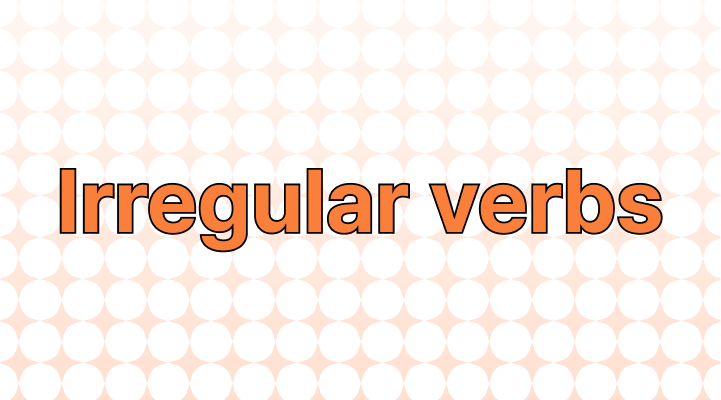Irregular verbs (like "go") are verbs that do not follow the typical pattern of conjugation (go→went, gone), often changing forms in unpredictable ways. These verbs, like "eat (ate, eaten) and "see" (saw, seen), add depth and nuance to English sentences with their unique forms.

Irregular verbs are an intriguing aspect of the English language, defying the regular pattern of conjugation observed in most verbs. Unlike regular verbs, which typically form their past tense and past participle by adding "-ed" to the base form (look→looked), irregular verbs undergo unique transformations. While irregular verbs may pose a challenge for English learners, mastering them is crucial for fluency. Let's explore some of the most common irregular verbs and delve into how they are used in sentences.
Be: The verb "be" is highly irregular, with distinct forms for the present tense (am, is, are), past tense (was, were), and past participle (been). For example:
- She is a talented musician.
- They were excited about the concert.
- I have been to Paris.
Have: This verb has irregular past tense forms (had) and past participle forms (had). For instance:
- She had a wonderful time at the party.
- We've already had dinner.
Do: The past tense form of "do" is "did", while the past participle is "done." Examples include:
- He did his homework yesterday.
- Have you ever done bungee jumping?
Go: The past tense and past participle forms of "go" are both "went". Example sentences:
- She went to the gym this morning.
- They've already gone home.
Come: "Come" changes to "came" in the past tense and "come" in the past participle. For instance:
- He came to the party late.
- Have you ever come across such an interesting book?
Take: The past tense and past participle forms of "take" are both "took". Examples:
- She took her time to complete the project.
- They've already taken the test.
See: "See" becomes "saw" in the past tense and "seen" in the past participle. For example:
- I saw a shooting star last night.
- Have you ever seen such a beautiful sunset?
Give: This verb has the past tense form "gave" and the past participle form "given". Examples:
- She gave me a birthday present.
- They've already given their consent.
Eat: The past tense of "eat" is "ate", and the past participle is "eaten". For instance:
- She ate sushi for dinner yesterday.
- Have you ever eaten Indian cuisine?
Make: "Make" changes to "made" in the past tense and "made" in the past participle. Examples include:
- He made a delicious cake for the party.
- They've already made reservations.
Common irregular verbs
As mentioned above, unlike most other verbs, you cannot turn irregular verbs into simple past tense form by simply adding an "-ed" at the end like regular verbs like "walk" (walked), "laugh" (laughed), or "play" (played).
Because there are no consistent rules for conjugating irregular verbs, their conjugations simply have to be memorized. For native speakers of English, this comes naturally as they frequently hear these verbs in context growing up, but for English learners, especially adult learners, often have to memorize all the conjugations of the commonly used irregular verbs manually. Thus, we curated a list of the most common irregular verbs for your convenience.
- be (was/were, been)
- have (had, had)
- do (did, done)
- say (said, said)
- get (got, got)
- make (made, made)
- go (went, gone)
- know (knew, known)
- take (took, taken)
- see (saw, seen)
- come (came, come)
- think (thought, thought)
- give (gave, given)
- find (found, found)
- tell (told, told)
- become (became, become)
- show (showed, shown)
- leave (left, left)
- feel (felt, felt)
- put (put, put)
These examples highlight the diverse forms that irregular verbs can take in different contexts. Mastering irregular verbs is essential for expressing actions accurately in English, adding depth and nuance to language proficiency.

Want to sound like a native speaker?
Engram’s AI-powered grammar checker makes your English sound like a native speaker’s, suggesting natural English expressions on top of fixing grammar, spelling, punctuation, word order, and vocabulary.














